
The Importance of Playgrounds for Children and Their Communities
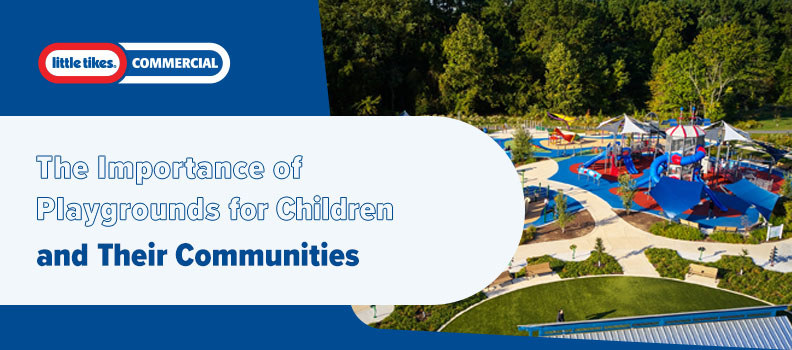
Play is one of the most indispensable gifts we can give kids of any age, and you can’t overlook the importance of having an accessible neighborhood playground. However, today’s children are overwhelmed with an abundance of activities and fewer opportunities to enjoy outside play. An increasing focus on academics and after-school activities, accompanied by the appeal of TV and video games, has led to disappearing playgrounds and playtime. This reduction in free play can negatively impact the development of children.
Playgrounds are vital safe spaces where children can be themselves and have fun while developing crucial cognitive, emotional, physical, and social skills. But children aren’t the only ones who benefit from community playgrounds — whole families, including adults, can also enjoy the advantages of these shared play areas. Learn more below about why playgrounds are important for child development and how recreation strengthens communities.
The Benefits of Playgrounds for Children
Playgrounds provide children with a safe space to have fun, but their benefits extend far beyond that. While children are having fun on the playground, they’re actually growing and developing in ways they could never imagine.
Playtime is an essential tool for nearly every aspect of child development, and playgrounds provide a host of fantastic developmental benefits for kids of all ages. The following list of facts about playgrounds proves just how crucial playground play is for children.

1. Strengthens Social Skills
Playgrounds are not generally a solitary activity. Whenever you visit a playground, other kids are bound to be there. While independent play has its perks, there are some benefits of play that can only come through social play — that is, play that involves interactions between at least two people.
Community playgrounds are the perfect spot to introduce and encourage social play among children. When children meet and connect with other kids on the playground, it teaches them important lessons about social norms and how to interact with others, all of which will come in handy in adult relationships. In short, interactive play can be a key way for children to develop important social skills. Learned social skills include the following:
- Listening and communicating
- Getting along
- Recognizing and respecting others’ emotions
- Agreeing on rules and cooperating
- Sharing and taking turns
- Resolving conflict
- Making compromises
- Overcoming shyness
- Sharing and friendship
- Accepting diversity as they meet children of all ages and backgrounds
- Including others in group games and activities
Many of these lessons come naturally as children interact on the playground. However, in some cases, parents or caregivers may need to step in to model social skills. For instance, adults may occasionally need to mediate disagreements or pull children aside to explain the importance of waiting your turn or making sure others feel included.
The playground provides plenty of opportunities for socialization and meaningful lessons on social skills, especially for children who don’t get to spend much time with their peers.
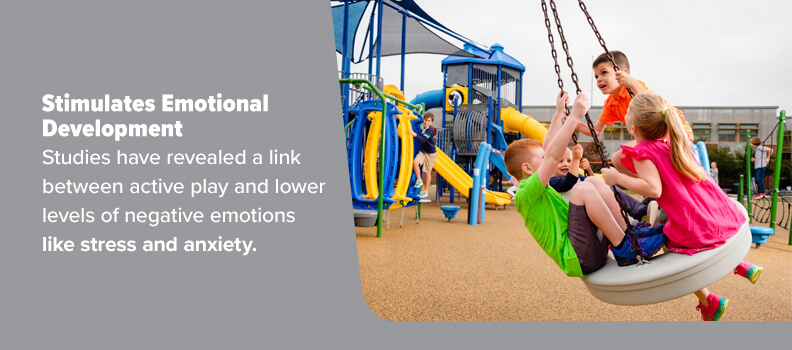
2. Stimulates Emotional Development
While the physical and social benefits of play are more obvious, regular access to neighborhood playgrounds also has a subtle emotional effect on your child’s well-being. Children can experience an intense range of emotions, and they’re still learning to regulate these emotions. Active play provides an effective outlet for helping children process their emotions and improve their mental health.
Studies have revealed a link between active play and lower levels of negative emotions like stress and anxiety. Research has also shown that active play can help reduce behavioral problems in young children. Playing on the playground provides an outlet for pent-up energy and stress, helping kids feel a bit lighter when they leave.
Physical activity alone can be beneficial for emotional well-being, but the thoughts and emotions children experience on the playground during unstructured playtime are beneficial, as well. For example, they can process emotions through imaginary play and learn how to overcome fears by exploring and using a new piece of playground equipment.
Children experience many other positive emotional impacts when they’re allowed the freedom to play on a playground. Playgrounds benefit children because they:
- Boost self-confidence and self-esteem as they master challenging playground structures.
- Allow them to retain a sense of control unavailable in many other parts of their lives.
- Lower tendencies to misbehave or bully as kids’ attention is diverted with more positive activities.
- Teach them how to deal with challenges in a healthy way.
Overall, time spent on the playground can allow kids to enjoy a more carefree childhood and help them process their emotions in a healthy way.

3. Encourages Physical Activity
The Centers for Disease Control and Prevention (CDC) recommends children should have at least 60 minutes of moderate to vigorous physical activity every day. The playground is the perfect place for it. Popular playground equipment like slides, swings, climbers, and other playground components help kids meet or exceed their recommended daily physical activity.
Unlike going to a gym, this physical activity simply feels like fun and games rather than a chore. When kids see exercising as an enjoyable experience that builds strength, it encourages them and sets the foundation for an active lifestyle as they become older.
Excess weight can lead to a variety of health issues and negatively impact children’s self-esteem and cause them to worry about social pressure and rejection. Many kids don’t have a place they can go to get up and move around, making it hard to lose excess weight and maintain or improve their health.
Helping kids get much-needed physical activity can help combat the issue of childhood obesity, which currently affects 19.7% of children and adolescents ages 2 through 19, according to the CDC. Playground access is an effective solution to help children stay healthy.
However, staying active isn’t just about maintaining a healthy weight. Children see a vast variety of physical benefits through playground play:
- Improved flexibility, agility, speed, and balance
- Development of overall motor skills, dexterity and hand-eye coordination
- Opportunities to learn how to control their movement
- Improved instincts
- Promotion of healthy heart and lung function
- Stronger muscles
- Improved immune function
- Lowered risk of obesity and diabetes
Overall, playgrounds are a vital aspect of healthy development, providing a place for children to get a full-body workout, including exercises that strengthen their arms, torso, and legs. From the cardiovascular system to the circulatory system, each is nurtured and benefited through vigorous play.
4. Promotes Creativity and Imagination
Children do more on a playground than sliding, swinging, and climbing. Just listen to the conversations, and you’ll realize a variety of other make-believe games are taking place. Acting out stories by themselves or with others is known as imaginary play or pretend play. Imaginary play is a given whenever kids are on the playground.
When a person is creative, they can come up with original ideas. Creativity is a life skill that we draw on continuously, even in adulthood. Children are naturally imaginative, and we should encourage them to lean into that quality to become even more creative to help prepare them for their future.
Additionally, when children use their imagination and play make-believe, it teaches them social roles. Creativity also fosters a child’s ability to problem-solve and develop their personality. By using their imagination, kids can try out different ideas and identities. This helps them construct a strong sense of self, as they discover their likes, dislikes and beliefs. Although developing self-identity will continue throughout their young life, the foundation begins with these innocent make-believe activities on the playground.
Playground equipment is ideal for pretend play as it provides sets and props to help kids bring all sorts of creative ideas to life. They may pretend they’re exploring a jungle or ocean, or they may play some form of “house” where they pretend to be grown-ups. No matter how children choose to play, creativity is a healthy quality for us all, and it’s an essential part of childhood.
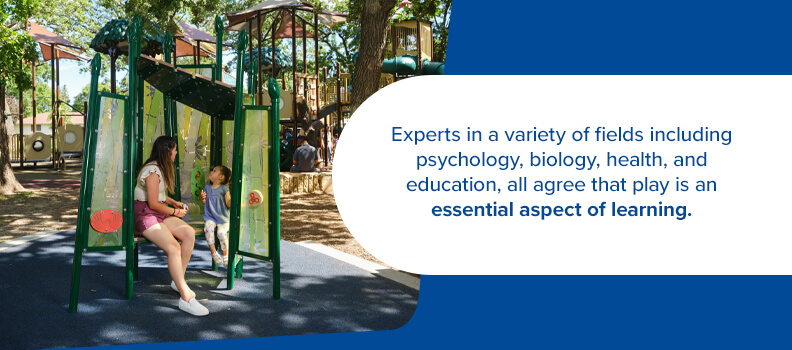
5. Boosts Cognitive Development
You can’t have a playground without play. To put it simply, play is a spontaneous activity children engage in to have fun. Experts in a variety of fields including psychology, biology, health, and education, all agree that play is an essential aspect of learning. A child’s curiosity fuels play. As a child grows, their play becomes more complex. Without being able to play, children’s ability to develop and learn is stunted. Just as eating and sleeping are essential to a child’s health, so too is play.
When children play, they gain a huge variety of skills:
- Coordination
- Motor skills
- Cognitive abilities
- Social awareness
- Language
Playgrounds are the perfect place for children to engage in free or unstructured play. When children are on the playground, different structures and spaces give them the freedom to choose how they want to play. They can explore their own natural tendencies, interact with a broader range of age groups and awaken their creative instincts. Unstructured play on the playground gives kids opportunities to develop their capacity for creativity, decision-making abilities, and problem-solving skills, especially at young ages.
Spending time playing on a school playground or at a public park can also help children perform better academically. Research shows what most parents and teachers could tell you firsthand — children focus better and are more productive when they get breaks for unstructured play. Regular breaks are necessary to help even adults absorb information and maintain focus, so it makes sense that it’s a must for kids too.
The CDC states that recess causes a significant increase in a child’s ability to focus and be creative after time on the playground. While some may see recess as a distraction from academics, research shows it is actually an excellent investment of time that helps kids do better in the classroom by improving their memory, concentration and attention levels.
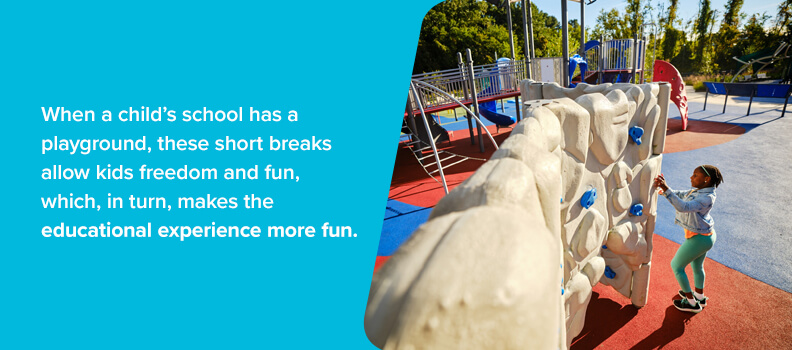
6. Makes Education More Fun
When a child’s school has a playground, these short breaks allow kids freedom and fun, which, in turn, makes the educational experience more fun. In fact, researchers now understand the importance of playgrounds in schools and how they have an important impact on a child’s ability to learn and develop.
Opportunities for play also affect children’s attendance rate at the primary school level. When a child knows there will be opportunities to let loose, they often find it easier to listen and learn in the classroom environment.

7. Increases Confidence and Self-Esteem
A child’s sense of self-worth and confidence is crucial to their overall mental health and well-being. This confidence can come in part from praise and encouragement from parents and teachers, but children also develop self-esteem as they exercise some independence and experience success on their own.
The playground can be a safe and supportive place for this independence and personal success to flourish. Each new experience, positive interaction with a peer, game won, and fear conquered can all add to a child’s positive self-image, helping them feel capable and secure in their identity.
A child who makes it across the monkey bars for the first time can feel a tremendous sense of accomplishment. A child who invents a game other children enjoy will admire their own creativity. Playgrounds are a great way for children to explore and develop their sense of self.
Social play on playgrounds can be especially valuable for children in building their self-esteem. As kids meet others in their community and make friends, they gain a sense of belonging and inclusion. Kids can also enjoy a boost to their own self-image when they welcome and include others. Accessible playgrounds can be especially helpful for making all children feel included.
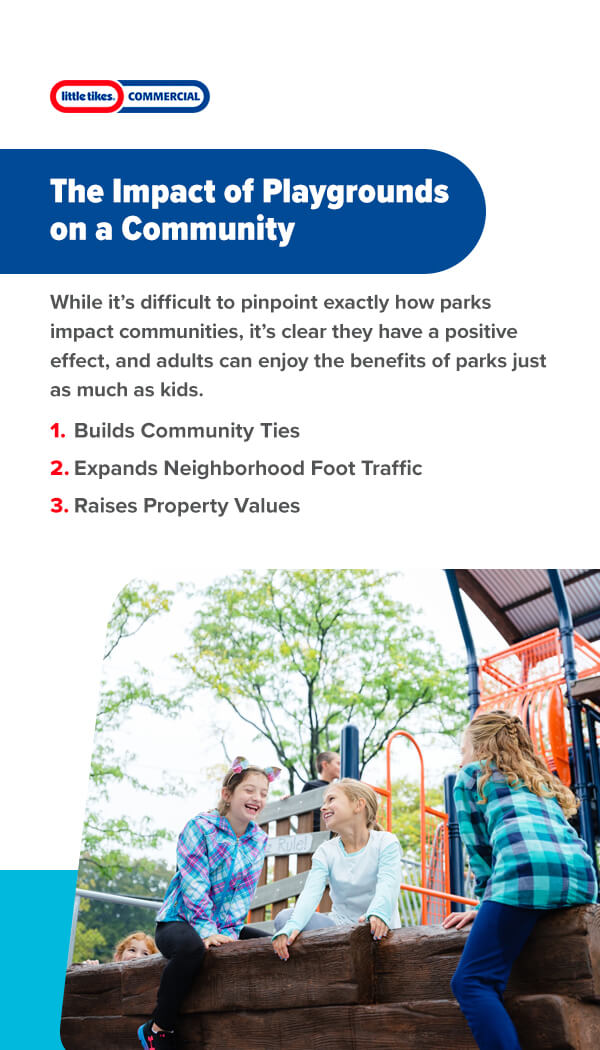
The Impact of Playgrounds on a Community
Of course, playgrounds have a positive impact on children, but they also greatly impact the community. A playground is a priceless investment in the developmental well-being of your community’s children. A community playground also provides a place where families can spend time together, forging relationships that strengthen the community. Neighbors can come together on the playground, getting to know each other better and forming safer, more engaged, and thriving neighborhoods.
While it’s difficult to pinpoint exactly how parks impact communities, it’s clear they have a positive effect, and adults can enjoy the benefits of parks just as much as kids.
1. Builds Community Ties
Today, just 26% of adults say they know all or most of their neighbors. That percentage is even lower for urban residents at just 24%. Luckily, city playgrounds can be a great way to remedy this community disconnect and help bring members of a community together.
Before playground installation even begins, community members can work together to set goals, vote on a custom playground design that will meet the neighborhood’s needs, and set up and run fundraisers to spark excitement for the project. They may even form a committee to handle playground assembly as a community.
Getting involved in the design, assembly, and maintenance processes fosters a sense of belonging within neighborhoods and gives people a chance to get to know neighbors they may have never talked to before. People feel like they’re wanted and accepted as they rally together around the project, encouraging them to continue their involvement in the community long after the playground is installed.
Neighborhood playgrounds strengthen the community and can create safe spaces for families to gather. Research shows that stronger communities lead to safer parks. An appealing park that attracts lots of families and kids can create an exceptionally safe place where negative behaviors are naturally deterred.
From the first step in the process, members are engaged and dedicated to providing the best playground solution. Plus, strengthening the sense of community allows parents and caregivers to fulfill their own needs for mental and social fulfillment.
2. Expands Neighborhood Foot Traffic
When there is a park within walking distance of home, families are likely to enjoy a stroll in the fresh air to get to the park. The more people are out and about, especially on foot, the more engaged a community can start to feel.
A town with lots of foot traffic feels vibrant, and businesses can thrive in this environment. For example, maybe the walk back from the park includes a stop at a locally owned ice cream parlor. Community members may even discover businesses and places in your community they would never have noticed otherwise.
No matter your community’s economic status, nearly any area can be improved by adding a well-maintained playground and recreational area that increases foot traffic throughout the neighborhood.
3. Raises Property Values
Finally, public parks and playgrounds can be a great asset to the wallets of community members, as recreational amenities can increase property values for surrounding residential homes.
Since many parents of young children look to move to an area where their kids can safely explore their surroundings, it’s easy to see why neighborhood playground equipment could be a draw for homebuyers. Community playgrounds are especially appealing to families in rental homes that may not have their own yards. In fact, nearby playgrounds are one of the top amenities parents look for when buying a new home.
A public park can be especially appealing to apartment renters who may not have a yard of their own where children can enjoy active play. If the apartment complex or the community at large has a playground that families can easily access, this can be a major perk.
Overall, playgrounds offer the perfect incentive for these families to move to the community, and community parks can be signs of healthy, happy neighborhoods where families can thrive.
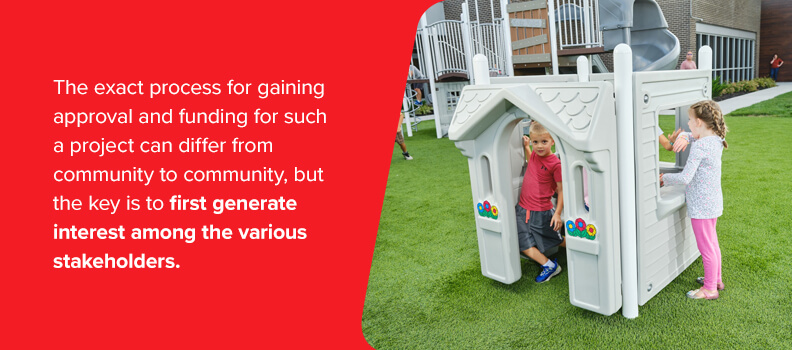
How to Get a Park Built in Your Neighborhood
Considering all the benefits of a park, you may feel disheartened if your community currently lacks a public playground. If you want your children and your whole community to enjoy all the benefits we discussed above, take action to make a community playground a reality in your neighborhood. Take advantage of public forums, such as town hall meetings or homeowner’s association (HOA) board meetings, to discuss the possibility of installing a public playground with other community members so you can get the ball rolling.
The exact process for gaining approval and funding for such a project can differ from community to community, but the key is to first generate interest among the various stakeholders. Educate others in the community on the benefits of community playground equipment and green spaces everyone can share. When the neighborhood or city gets motivated to bring these benefits to their own community, they’ll find a way to make it happen.
Little Tikes Commercial can help walk you through the logistics of this project. Make sure you choose quality commercial playground equipment from a brand you can trust for your new playground. At Little Tikes Commercial, we design and manufacture our equipment to fully capitalize on the potential benefits playgrounds can offer. And our equipment is made to last, so with proper care, you can continue to reap these benefits long-term.

Experience the Benefits of Playgrounds With Little Tikes Commercial Playground Equipment
A playground is more than just a place to play — it’s a place for families to bond, a hub for communities to gather, and a fantastic tool in child development. At Little Tikes Commercial, we believe in the immense power of the playground. We offer only the highest quality playground equipment to benefit your neighborhood for years to come.
For over four decades, we’ve encouraged children to explore their world and learn fundamental lessons through adventure and imagination. Whether you’re looking to replace the playground at your school or want to add some play structures to your community park, we’re committed to delivering innovative designs to promote the value of outdoor play and fun for the children you serve.
We’ve helped many communities just like yours build the playground of their dreams through design, financing, planning, and other services that ensure you get the support you need. Contact us today to see what we can do to assist you with your playground project.
Related Posts:
The Benefits of Installing a Community Playground
Benefits of Playground Slides for Children
Different Types of Play and Benefits in Child Development
Benefits of Outdoor Recess for Productivity in School
